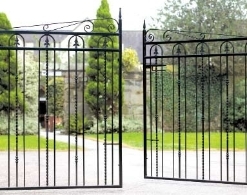Gate posts form the backbone of any gate installation. Their size can make the difference between a gate that works smoothly for years and one that sags within months. Let's explore how to get it right first time.

Size Really Matters
Think of gate posts like tree trunks - they need to match the load they're supporting. A heavy wrought iron gate needs substantial posts. A lightweight aluminium design can work with slimmer options.
Post Sizing Basics
For standard garden gates under 1.2m wide:
- 100mm x 100mm posts work well
- Timber or metal options suit these dimensions
- Height needs 600mm extra for ground fixing
Larger gates need beefier posts:
- Double gates want 150mm x 150mm posts
- Driveway gates often need 200mm x 200mm
- Heavy ornamental gates might need even larger
Material Choices
Metal posts bring certain advantages:
- Greater strength at smaller sizes
- No rotting worries
- Perfect for metal gates
- Clean, modern look
Wooden posts offer their own benefits:
- Natural appearance
- Cost-effective
- Easy to work with
- Good with wooden gates
Ground Conditions Count
British weather throws everything at gate posts. Clay soils need deeper fixing. Sandy ground might need wider foundations. Local conditions affect post size choices.
Professional Tips
Experience shows that:
- Bigger posts rarely cause problems
- Undersized posts always do
- Corner bracing helps
- Concrete depth matters more than width
- Good drainage prevents issues
Double Gate Requirements
Double gates need extra thought:
- Centre meeting point needs support
- Both posts take uneven loads
- Opening forces create twisting
- Diagonal tensions need managing
Real-World Factors
Gate weight tells only part of the story:
- Wind loads add forces
- Children swing on gates
- Cars bump driveway gates
- Ground moves seasonally
Common Mistakes
Avoiding these issues saves headaches:
- Posts too short above ground
- Foundation too shallow
- Undersized for the gate
- Poor concrete mix
- Inadequate drainage
Making the Right Choice
Consider these points:
- Gate size and weight
- Local soil type
- Exposure to weather
- Usage patterns
- Aesthetic preferences
Good gate posts make everything work better. They keep gates level, swinging freely and working properly year after year. Choosing the right size first time prevents problems later.
Remember: posts can be too small, but they're rarely too big. When in doubt, go up a size. The extra cost pays off through years of trouble-free operation.



